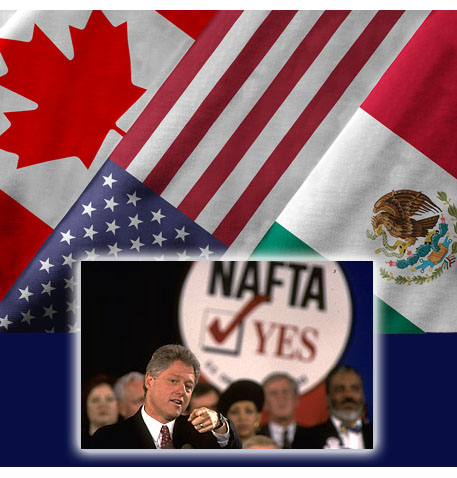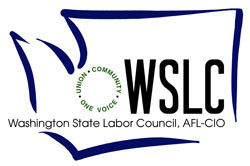NATIONAL
Tell USTR: Put people over profits in NAFTA renegotiations
 WASHINGTON, D.C. (June 8, 2017) — America’s labor movement has been a persistent and steadfast critic of the North American Free Trade Agreement (NAFTA) and similar trade deals that prioritize corporate profits and investors’ rights over the well-being of people. The Trump administration has formally announced that it intends to renegotiate the terms of NAFTA and the U.S. Trade Representative (USTR) is currently accepting public comment regarding the NAFTA’s “modernization” through Monday, June 12.
WASHINGTON, D.C. (June 8, 2017) — America’s labor movement has been a persistent and steadfast critic of the North American Free Trade Agreement (NAFTA) and similar trade deals that prioritize corporate profits and investors’ rights over the well-being of people. The Trump administration has formally announced that it intends to renegotiate the terms of NAFTA and the U.S. Trade Representative (USTR) is currently accepting public comment regarding the NAFTA’s “modernization” through Monday, June 12.
All supporters of trade policies that protect the interests of workers, consumers and the environment are encouraged to submit comments here. (Get more background information and/or instructions for commenting here.)
For some ideas about what organized labor and fair trade advocates want in modern trade deals, see this petition from a coalition of fair trade advocates and AFL-CIO President Richard Trumka’s statement on the issue. Also, here are the comments that have been submitted to the USTR on behalf of the Washington State Labor Council, AFL-CIO:
 Thank you for the opportunity to submit input on behalf of the Washington State Labor Council, AFL-CIO regarding the upcoming renegotiation of the North American Free Trade Agreement.
Thank you for the opportunity to submit input on behalf of the Washington State Labor Council, AFL-CIO regarding the upcoming renegotiation of the North American Free Trade Agreement.
The renegotiation of NAFTA provides an opportunity to reset trade agreements so they work in the interests of working people, both here and in the countries with whom we trade. Our members — and workers who are not in unions — have felt the negative impact of trade agreements designed to liberalize trade in ways that protect and increase the profits of multinational corporations and investors. These trade deals have exacerbated wealth inequality, furthered a race to the bottom in wages and working conditions, ballooned the U.S. trade deficit, and impinged on the ability of nations to enact public policies in the interest of their people.
Instead, trade agreements should focus primarily on raising the standards of living for people living in the countries engaged in trade. That must be the foremost consideration, not an assumption that the benefits of liberalizing trade for corporations will eventually trickle down. Clearly, they do not.
The key areas for improvement of NAFTA include:
1. Ensure labor and environmental standards are high, clear, and enforced. The labor and environment side agreements — the North American Agreement on Labor Cooperation and the North American Agreement on Environmental Cooperation — were put together merely to silence critics, not to effectively raise standards for workers or ensure clean air and water. These standards need to be strengthened, included in the core trade agreement, and have provisions for clear and certain sanctions for violations.
2. Eliminate Investor-State Dispute Settlement (ISDS). Private panels of corporate lawyers, unaccountable to the public, should not be empowered to challenge local, state, and federal laws. This system, which favors the interests of corporations over people living in trading countries and their governments, not only has awarded millions of dollars in public funds to private businesses, it has also had a chilling effect on policymakers attempting to protect the health and well-being of their constituents. It gives an unfair advantage to corporations without a concomitant process for the resolution of labor and environmental issues. It also advantages large corporations over small producers and their employees.
3. Create binding rules on currency manipulation that are subject to enforcement and sanctions. Without addressing currency manipulation, no trade agreement can be implemented fairly. Currency manipulation gives unfair advantage to the countries that use it, as we’ve seen with China and Japan. Mexico devalued the peso within months of the approval of NAFTA, wiping out gains from tariff reductions, making imports from Mexico unreasonably cheap, and pricing U.S. exports out of reach for Mexican consumers. Binding rules on currency manipulation, subject to sanctions are necessary for a renegotiated NAFTA.
4. Rules of origin must be upgraded, clear, and enforced. NAFTA’s current rules on automobiles, for example, allow nearly 40% of a car to be made somewhere other than Mexico or Canada. A higher standard that eliminates loopholes and provides incentives to produce products in North America will create more jobs. Plus, it will reduce the carbon footprint of parts traveling around the world to falsely be “deemed originating” in North America.
5. Delete the procurement chapter that undermines “Buy American” laws (Chapter 10). Local governmental agencies, the Departments of Commerce, Defense, Education, Veterans Affairs, and Transportation should be able to make purchasing decisions that enable investment in local economies. The current procurement provisions undermine efforts to create jobs and the entire chapter should be eliminated.





